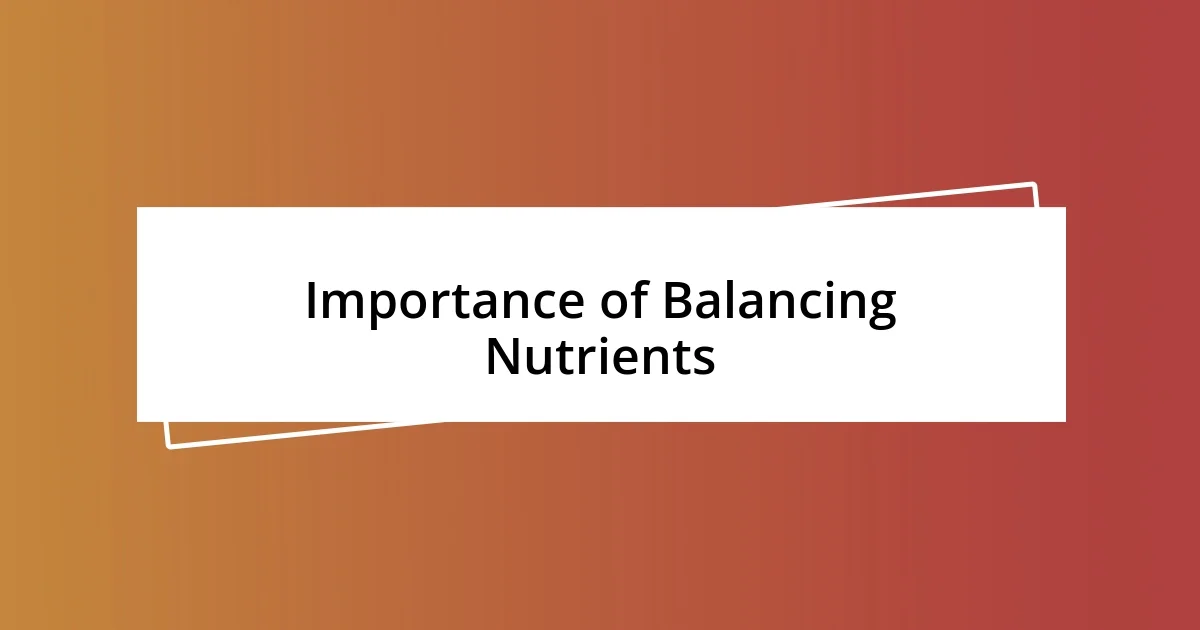Key takeaways:
- Carbohydrates are essential for energy, while proteins are crucial for muscle repair and growth; a balanced intake of both supports optimal performance and recovery.
- Understanding personal daily macronutrient needs based on activity level, goals, and body composition can significantly enhance energy and overall health.
- Meal planning, focusing on whole foods, and tracking macronutrient intake help maintain nutrient balance and improve physical and mental well-being.

Understanding Carbohydrates and Proteins
Carbohydrates and proteins play vital roles in our diet, serving as essential macronutrients that our bodies need for energy and repair. I remember when I first started my fitness journey; I was overwhelmed by the varying opinions on how much of each I should consume. It made me realize just how important it is to understand these nutrients’ functions before making choices that impact my health.
Carbohydrates are often viewed with skepticism, yet they are our body’s primary energy source. I used to skip carbs thinking they would stall my goals, but I soon learned that incorporating the right types, like whole grains and fruits, fuels my workouts and keeps me energized throughout the day. This balance is crucial—have you ever tried to power through a workout with low energy? It’s a struggle!
On the other hand, proteins are vital for muscle repair and growth. After hitting the gym, I always prioritize a protein source in my meals, like chicken or legumes, to support recovery. It’s fascinating to think about how these nutrients work together; without a proper balance, I’d feel sluggish or even hinder my progress. Isn’t it amazing how understanding what fuels our bodies can transform our approach to nutrition?

Importance of Balancing Nutrients
Balancing carbohydrates and proteins is crucial for overall health and well-being. From my experience, when I neglect one in favor of the other, I often feel the consequences both physically and mentally. I remember a time when I focused too much on protein and not enough on carbs, leading to fatigue and irritability; this was a clear sign that my body was missing essential nutrients.
When I think about the importance of these macronutrients, it’s evident that they work synergistically. Carbohydrates provide energy, while proteins help build and repair tissues. I’ve seen firsthand how a misaligned diet affected my workouts and recovery. It’s fascinating to see how well-balanced meals empower us to perform at our best. Have you ever noticed how your body responds when you fuel it right? It’s like giving a car the supreme gasoline it craves—it runs smoother!
Incorporating a reasonable balance helps maintain stable blood sugar levels and improves mood. I’ve learned that when I combine healthy carbs with proteins, I not only feel satisfied but also energized to tackle the day ahead. The connection between what we eat and how we feel is profound. Wouldn’t you agree that understanding this balance can dramatically enhance our quality of life?
| Nutrient | Role in the Body |
|---|---|
| Carbohydrates | Primary energy source |
| Proteins | Muscle repair and growth |

Calculating Your Daily Needs
Calculating your daily needs for carbohydrates and proteins is a personalized process that can profoundly impact how you feel and perform. I remember the first time I sat down with a nutrition calculator—seeing the numbers laid out changed my perspective entirely. It helped me realize that these macronutrient ratios aren’t just arbitrary; they’re a roadmap to optimizing my energy levels and overall health.
To calculate your needs accurately, consider these key factors:
- Activity Level: Are you sedentary, moderately active, or highly active? More activity generally means higher carbohydrate needs.
- Goals: Are you looking to maintain weight, lose fat, or build muscle? Your goals will influence your protein intake.
- Body Composition: Your weight, muscle mass, and metabolic rate all play roles in determining your macronutrient needs.
Using these guidelines, you can tailor your nutrient intake to suit your unique lifestyle, and trust me, the transformation can be remarkable. I remember feeling significantly more energized and focused during my workouts once I understood my specific daily requirements—it’s like suddenly having the right fuel for my engine!

Choosing Quality Food Sources
When it comes to choosing quality food sources for balancing carbs and proteins, I’ve found that whole foods often make all the difference. For instance, I remember a time I decided to swap white bread for whole grain; the change was shocking. Not only did I feel fuller, but my energy levels were consistently stable throughout the day. Have you ever felt the noticeable difference when opting for whole foods over processed ones? It’s like a light switch—everything seems brighter.
I also prioritize lean proteins, such as chicken and fish, over processed meats. This choice isn’t just about the nutrient profile; it’s about how much better I feel. After a hearty meal of grilled salmon and quinoa, for example, I recall feeling satisfied and alert, ready to tackle whatever the day had in store. The nutritional quality of what I eat directly impacts my mood and performance.
Now, I recognize that not every food labeled “healthy” is actually beneficial. I’ve occasionally fallen into the trap of “low-fat” products, only to discover they were packed with sugar. It’s a reminder that being informed about food labels is crucial. Have you checked the ingredients of your favorite snacks lately? You might find surprises that could change your perspective on what you’re fueling your body with. The more I focus on nutrient-dense, whole foods, the better I feel physically and mentally.

Meal Planning for Balance
Meal planning for balance is essential to making sure you’re meeting your carbohydrate and protein needs efficiently. I still remember my first attempt to plan meals for an entire week; it took a bit of trial and error, but it turned out to be a game-changer for my nutrition. By dedicating a little time to organizing my meals, I found it much easier to hit those ideal macronutrient targets without feeling overwhelmed.
One approach I’ve embraced is batch cooking. After a long week of work, the last thing I want to do is start from scratch in the kitchen. I’ll cook a big batch of brown rice, roast a tray of veggies, and grill several chicken breasts all at once. With everything prepared, I can mix and match throughout the week. Have you ever noticed how much simpler it is to make healthy choices when your food is ready to go? It’s like having a safety net that keeps me from veering off course.
I also find it incredibly helpful to keep snacks on hand that align with my meal plan. For instance, I love having Greek yogurt and mixed nuts as an easy, balanced option that combines protein and healthy fats. Sometimes, I catch myself reaching for processed snacks when I’m in a rush, but then I remember how much better I feel when I opt for whole food alternatives instead. Have you ever experienced that feeling of satisfaction when you munch on something nutritious and tasty? Trust me, once you get the hang of meal planning, it becomes second nature and you’ll find yourself thriving along the way.

Adjusting for Activity Levels
Adjusting my carbohydrate and protein intake based on my activity levels has been a game changer for my overall health. For instance, on days when I hit the gym hard or go for a long run, I consciously increase my carb intake. I remember one particularly grueling workout where I had a solid bowl of oatmeal topped with fruits beforehand, and I felt unstoppable. Isn’t it fascinating how the right fuel can elevate your performance?
On lighter activity days, I’ve learned to dial back my carbs a bit and focus more on protein. It’s interesting to see how my body responds when I switch my meals to emphasize lean proteins like turkey or legumes. I recall a day when I prepared a hearty lentil salad with plenty of veggies. It kept me feeling energized and satisfied without the sluggishness I sometimes encounter after a carb-heavy meal. Have you ever adjusted your food choices based on how active you are? It’s an enlightening experience.
Tracking how I feel on different activity days has taught me a lot about my personal needs. There are times I get the urge to binge on carbs, especially on rest days, but I remind myself of how much better I feel when I balance things out. The clarity that comes from a meal of eggs, spinach, and quinoa over a plate of pasta is hard to beat. In essence, adjusting my intake not only fuels my body but also directly impacts my mood and productivity. What about you? Have you noticed a difference when you mindfully balance your macronutrients throughout the week?

Tracking and Adjusting Your Intake
Keeping track of my macronutrient intake has been essential for achieving my dietary goals. I often use mobile apps to log my meals, which I find quite handy. This way, I’m able to visualize how many carbs and proteins I consume daily. Have you ever noticed how logging can shine a light on your eating habits? It’s a real eye-opener!
I remember the first time I hit a plateau in my fitness journey. It turned out I was underestimating my portion sizes, especially with carbs. By tracking meticulously, I realized I wasn’t meeting my protein goals as I thought. With some adjustments—like adding a high-protein snack before bed—I felt my energy levels rebound. It’s almost magical how small tweaks can lead to significant changes.
As I learned to adjust my intake, I began to see my meals as more than just fuel; they became a reflection of my lifestyle and goals. On days when I felt depleted, I made it a point to analyze my logs. Did I meet my protein requirement? How about my carbs? I recall a day when I had an extra scoop of cottage cheese after dinner because I noticed I was shy on protein. It might sound simple, but those conscious decisions helped me stay aligned with my nutrition goals. Have you tried this kind of self-reflection in your tracking? It’s enlightening to understand your body’s needs better.














